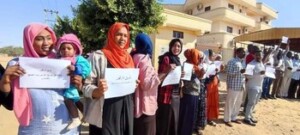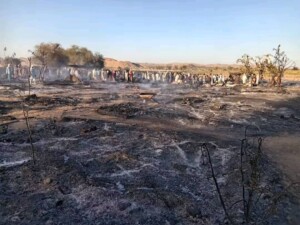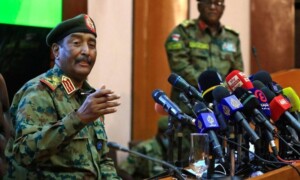Sudan PM briefs envoys, FFC on talks with military
Sudanese Prime Minister Abdallah Hamdok briefed the members of the Central Leadership Council of the Forces for Freedom and Change in Khartoum on Wednesday on the results of his meetings with military members of the Sovereignty Council earlier this week.
The next day, Thursday, Hamdok also briefed foreign diplomats on the developments in the country, in particular on the mediation attempts to reduce tensions between civilian and military members of the Sudanese government.
 PM Abdallah Hamdok at his office in Khartoum, October 2019 (SUNA)
PM Abdallah Hamdok at his office in Khartoum, October 2019 (SUNA)
Sudanese Prime Minister Abdallah Hamdok briefed the members of the Central Leadership Council of the Forces for Freedom and Change in Khartoum on Wednesday on the results of his meetings with military members of the Sovereignty Council earlier this week.
The next day, Thursday, Hamdok also briefed foreign diplomats on the developments in the country, in particular on the mediation attempts to reduce tensions between civilian and military members of the Sudanese government.
Following an aborted coup attempt on September 21, tensions between Sudanese military and civilian leaders resurfaced. The military accused civilian politicians of squabbling and quarrelling over positions, while civilian members of the government criticised the military leaders for “claiming a monopoly of guardianship over the country and the sole right to lead it through the transitional period”.
In response, the head of the UN Integrated Mission to Support the Transition in Sudan (UNITAMS) held a series of meetings with the members of the Sovereignty Council. In end September, South Sudan, France, and the USA sent envoys to Khartoum to pressure the disputing parties to continue their cooperation during the 39-month transitional period.
Last week, several national initiatives were launched in Khartoum to defuse tensions between various components of the Sudanese government. On Saturday, thousands of people took part in demonstrations in the country in support of the democratic transition. They called for the establishment of a civilian government.
‘Committed’
The Central Leadership Council of the Forces for Freedom and Change (FFC) affirmed to the PM its “commitment to the partnership with the military in accordance with the 2019 Constitutional Document”. The members also reiterated their desire “to expand the base of Freedom and Change by including all the revolutionary forces that have an interest in civil democratic transformation”.
Jaafar Hasan, the official spokesman for the Central Leadership Council for Freedom and Change, called in a forum held at the office of El Tayyar newspaper in Khartoum on Thursday, that “the Sudanese people are the guardians of the country”.
The problems between the civilian and the military components of the Sudanese government that “began three months ago,” have led to a delay in the appointment of a new Chief Justice, attorney general, and the formation of a number of commissions.
Hasan described the military component of the Sovereignty Council as a political group. “Criticising the military members of the Sovereignty Council does not mean insulting the military institutions,” he stressed.
Tripartite committee
On Tuesday, Hamdok, seconded by a number of political leaders, met with the military members of the Sovereignty Council headed by Lt Gen Abdelfattah El Burhan, to address the current political crisis between partners, as well as the situation in eastern Sudan.
In June this year, PM Hamdok launched The Way Forward, an initiative “to unify the revolutionary forces in the government” with the aim to address “the comprehensive national crisis” in Sudan. A national mechanism for the implementation of the initiative was established in August.
After relations between the military and civilian members of the government worsened after the coup on September 21, a tripartite committee, consisting of military, rebel, and civilian officials, was formed “to communicate with all parties to the political crisis in the country”.
Civilian rule
According to the FFC Central Leadership Council, time has come to hand over the presidency of the Sovereignty Council to civilians*. In a statement on Wednesday, the Council pointed to the agreement between the military and the FFC to alternate the chairmanship of the Sovereignty Council, as stipulated in the August 2019 Constitutional Document.
The FFC Central Leadership Council also stressed the need for “direct cooperation” in order to resolve the current political crisis. The Council further stated it will continue to support the Empowerment Removal Committee “in completing its necessary tasks for a successful transition.
The new civilian government “should take over the economic and security resources of the police forces and the General Intelligence Service”. The FFC Council further stressed the need to reform the security and military sectors, and building a single Sudanese army**.
* The 39-month transitional period originally began in August 2019, with the signing of the Constitutional Document by the then military junta and the FFC. The Constitutional Document stipulated the formation of a Sovereignty Council that would form the collective head of state of the country. The Council was composed of five civilians chosen by the FFC, five military representatives, and a civilian selected by agreement between the FFC and the military. The chair for the first 21 months would be a military member. For the remaining 18 months, the council would be chaired by a civilian member.
Following the signing of the Juba Peace Agreement on October 3 last year, three seats were added to the Sovereignty Council, for rebel leaders El Hadi Idris, Malik Agar, and El Taher Hajar. The starting date of the transitional period was changed to the date of the signing of the peace accord. On demand of the members of the Sudan Revolutionary Front (SRF) rebel alliance, the starting date of the transitional period was changed to the date of signing the peace accord.
** It was agreed in the In the Constitutional Document of august 2019 that both the army and the paramilitary Rapid Support Forces (RSF) will fall under the command of the “Supreme Commander of the Sudan Armed Forces”. At the same time however, the militia would stay a force unto intself, commanded by Mohamed ‘Hemeti’ Dagalo, Vice-President of Sudan’s Sovereignty Council.
In the Juba Peace Agreement, the Sudanese government and the Sudan Revolutionary Front rebel alliance agreed to merge the Sudanese army, the RSF, other security forces, and the rebel combatants into “a single unified regular force that serves the supreme interests of State of Sudan”. In June this year however, Hemeti publicly refused the integration of his RSF forces into the Sudanese army.











 and then
and then